Most viewed materials from past 30 days
None were found.

Paraphrase Practice
Published: 04.12.2019
This exercise is provided as an example and the given original text can and should easily bereplaced with a text which fits into the context of your subject matter. The exercise isintended to be used to support students in developing good paraphrasing skills. It addressesalso typical errors which ar

A Guide to Identifying Predatory Journals and Publishers - Checklist
Published: 15.04.2024
This checklist is designed to guide researchers and authors in identifying potential predatory journals and/or publishers. Predatory journals and publishers are a concerning phenomenon in academic publishing. Identifying potentially predatory, poor quality or disreputable publishers / jou
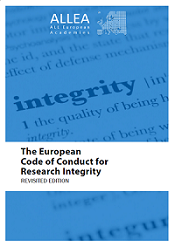
The European Code of Conduct for Research Integrity
Published: 06.08.2019
The linked webpage contains the links to the Code in all the above-mentioned languages. The European Code of Conduct for Research Integrity serves the European research community as a framework for self-regulation across all scientific and scholarly disciplines and for all research settings.
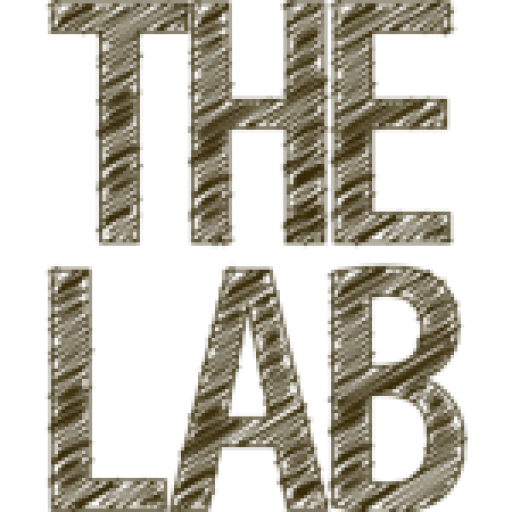
The Lab: Avoiding Research Misconduct (Interactive Movie)
Published: 12.05.2023
In "The Lab: Avoiding Research Misconduct," you become the lead characters in an interactive movie and make decisions about integrity in research that can have long-term consequences. The simulation addresses Responsible Conduct of Research topics such as avoiding research misconduct, mentorship res
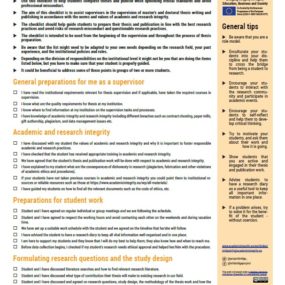
Checklists on academic and research integrity in thesis writing
Published: 24.10.2022
Three brief checklists focused on academic and research integrity. The first is intended for master students writing their own thesis, the other one is for PhD students writing and publishing their first paper and the third one is for their supervisors. The checklists guide the student or superviso

Understanding academic integrity
Published: 28.04.2021
TEQSA has developed these free resources to help strengthen academic integrity at Australian higher education institutions. These materials are free to use by students, academics and providers in-class, on campus or as part of student-focused communications on websites, intranets, in newsletters or

Integridad académica en mi labor docente
Published: 28.02.2021
Curso introductorio sobre integridad académica en la labor docente. El participante analizará los planteamientos relativos a la integridad académica desde su definición hasta su aplicación en la labor docente tomando en cuenta la importancia de su figura como profe
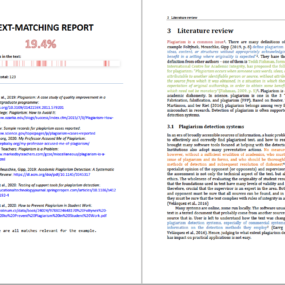
Interpreting Similarity Reports
Published: 09.09.2021
Slides (and structure) of a workshop focused on work with similarity reports from systems supporting plagiarism detection. There are three PDFs attached - they are the reports which will be used for the decisions.

Seneca’s Integrity Matters application
Published: 13.02.2021
Seneca’s Integrity Matters application (app) is intended to enhance students’ knowledge and understanding of academic integrity that will help them make informed decisions.This app has been adapted from the University of Waterloo’s Foundations for Academic Success App, which was de

Set of real-life examples related to academic integrity
Published: 20.06.2019
This is an overview of real-life examples – educational materials which were created within the Erasmus+ project European Network for Academic Integrity. Each real-life example illustrates importance of the values of academic integrity in professional life. It is a ready-to-use case study acco

Text Recycling Research Project
Published: 06.07.2021
The Text Recycling Research Project (TRRP) has just released guidelines and educational materials for editors and authors on text recycling in research writing: Best Practices for ResearchersUnderstanding Text Recycling: A Guide for ResearchersUnderstanding Text Recycling: A Gui

Avoiding Predatory Journals and Questionable Conferences: A Resource Guide
Published: 18.03.2024
Purpose: The goal of this guide is to provide a clear overview of the topics of predatoryjournals and questionable conferences and advice on how to avoid them. This guideintentionally adopts a plain language approach to ensure it is accessible to readers with avariety English language proficiency le
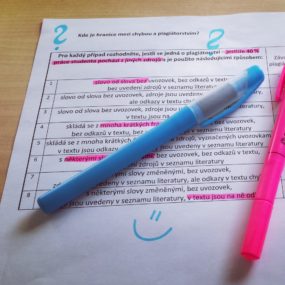
Where is the borderline between poor academic practice and plagiarism?
Published: 22.06.2018
The exercise is intended to be used in the context of a learning unit on academic writing, referencing, academic integrity or introducing research skills. The students should read the eight specified cases and decide if they think this is a case of serious plagiarism, plagiarism, not plagiarism or

Onlinekurs: Gute wissenschaftliche Praxis
Published: 21.06.2021
Die Wissenschaft hat sich Regeln gegeben: die Prinzipien guter wissenschaftlicher Praxis. Sie zu kennen ist eine wichtige Orientierungshilfe, um Angst vor unbeabsichtigtem Fehlverhalten abzubauen. Der Onlinekurs Gute wissenschaftliche Praxis legt einen Grundstein für regelkonformes, eigenverant

Academic Integrity in Space
Published: 27.10.2020
Promote Academic Integrity and Policy 60 education through game play with the AIO's new resource: Academic Integrity in Space! Students go head-to-head with Captain Plague and the League of the Unearned to learn about academic integrity and to earn certificates from the planets Ethica, Originon, and
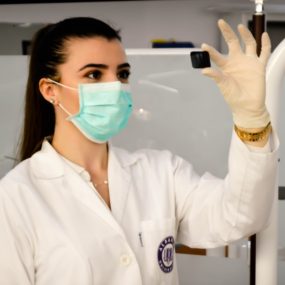
Real-life example: Blaming the nurse
Published: 04.08.2019
This document is a real-life example illustrating importance of the values of academic integrity in professional life. It was created as a part of Toolkit for cross-sector cooperation in terms of academic integrity within Erasmus+ project. It is a ready-to-use case study accompanied with didactic n
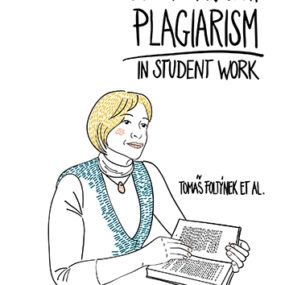
How to Prevent Plagiarism in Student Work
Published: 03.02.2021
The handbook for academic staff is the output of the centralized development project of the Ministry of Education, Youth and Sports "Strengthening the prevention of plagiarism in student work" and represents the agreement of the author's team from eight Czech universities. It summarizes the basic in
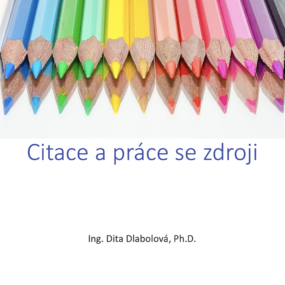
Citace a práce se zdroji
Published: 30.09.2020
Materiál určený pro samostudium, pro distanční výuku.Je tvořený prezentací, která se odkazuje na dalšá konkrétní volně dostupné zdroje, které si studenti sami dostudují - konkrétní kapitol

Real-life example: Responses to ethical dilemmas in working life can have life-threatening consequences
Published: 04.08.2019
This document is a real-life example illustrating importance of the values of academic integrity in professional life. It was created as a part of Toolkit for cross-sector cooperation in terms of academic integrity within Erasmus+ project. It is a ready-to-use case study accompanied with didactic n

Plagiarism Checker
Published: 11.10.2018
Flow chart to check for plagiarism
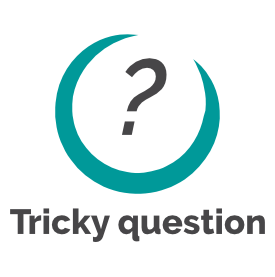
How to build a culture of academic integrity at your institution?
Published: 17.12.2019
An expert provided an answer on a tricky question on academic integrity. Shortened version was previously in regular ENAI newsletter (December 2019). Experience with a successful process of building an academic integrity culture at a campus in a country with a high level of corruption is shared by

How do plagiarism checkers work
Published: 24.10.2018
Very brief introduction into anti-plagiarism systems and how do they work.

PhD loses his way
Published: 12.10.2018
Abstract: A mature-aged PhD student is not provided with adequate support during the early stages of his candidature and submits a research proposal which contains plagiarism. Rather than face an academic integrity investigation, he withdraws from his program of study. Target audience: Higher Degre
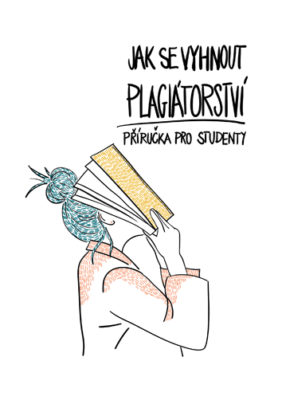
Jak se vyhnout plagiátorství
Published: 04.02.2021
Příručka pro studenty je výstupem centralizovaného rozvojového projektu MŠMT „Posílení prevence plagiátorství ve studentských pracích“ a představuje shodu autorského kolektivu z osmi českých u

Primer iz resničnega življenja: Nezaupanje (poslovna etika)
Published: 19.10.2019
Ta dokument je primer iz resničnega življenja in prikazuje pomen akademske integritete v profesionalnem življenju.Pripravljen je bil kot del Orodja za medsektorsko sodelovanje v smislu akademske integritete (Toolkit for crosssector cooperation in terms of academic integrity) znotraj Erasmus+ projekt

Plagiarism and Academic Integrity Game
Published: 26.04.2019
Interactive game about consequences of plagiarism, information sharing, unintentional plagiarism, forms of plagiarism and other related issues. The game is using the format of a TV show Jeopardy, it is freely available at JeopardyLabs.org and was created by an anonymous author. Basic game instruct

Tips for written work
Published: 15.10.2018
Organization of the text+Cohesion You will find some videos that may be helpful when building a text.

Collusion versus collaboration
Published: 12.10.2018
Purpose of the case is to assist lecturers to work through their own policy and reflect on teaching and learning practices to address a seemingly simple case. The case study consists of: description (PDF), presentation (PPTX). Find more similar case studies at Academic Integri

Example from Mr. Apple’s blog
Published: 21.06.2018
The exercise is intended to be used in the context of a learning unit on referencing, academic integrity or introducing research skills. The exercise simply consists of one slide. The example is a real life case which was anonymised. The real case ended up in court and Apple was sued by Lemon. The

Wo liegt die Grenze zwischen schlechter akademischer Praxis und Plagiarismus?
Published: 02.05.2019
Die Übung ist dazu gedacht, im Rahmen einer Lerneinheit zum Thema Schreiben, Zitieren, akademische Integrität oder Einführung in das wissenschaftliche Arbeiten eingesetzt zu werden. Die Teilnehmer lesen die acht angegebenen Fälle und entscheiden nach ihrer eigenen Meinung, ob es